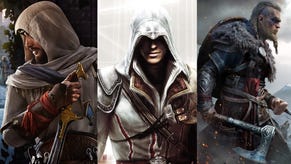Assassin's Creed boss reflects on series' "struggle" to tell consistent modern day story after Desmond
And how its modern day story will benefit historical narrative going forward.
It's been 12 years since Assassin's Creed 3 ended the story of Desmond Miles, the series' first recurring modern day protagonist and link between each game until that point.
Now, speaking at a BAFTA event held in London on Friday evening attended by Eurogamer, Assassin's Creed franchise boss Marc-Alexis Coté has reflected on the series' struggles to tell a meaningful, connected narrative ever since - and how this will finally be rectified in future.
"When the Assassin's Creed franchise was created, it introduced a bold and innovative narrative structure, a modern day story arc centred around Desmond that was intertwined with historical adventures," Coté recalled. "Desmond's journey was at the heart of the modern day conflict driving the search for powerful Isu artefacts - Pieces of Eden - that could change the course of history. However, with his death at the end of Assassin's Creed 3, we faced a creative crossroads.
"Ending Desmond's arc was a difficult decision," Coté added, "and afterward, the modern storyline struggled to find its footing."
Subsequent games initially featured no specific modern day protagonist, before a replacement for Desmond was eventually introduced - Layla Hassan. But the length of time between different games and the shifting teams behind each entry meant the narrative suffered from being too sporadic, too inconsistent, and too repetitive.
"The continued focus on characters hunting for Isu artefacts made the narrative more predictable," Coté continued, "and reduced the conflict between Templars and Assassins to a straightforward pursuit of control over - let's be honest - magical relics. This shift pulled focus away from what had always been at the heart of the franchise: exploring our history.
"As this approach became repetitive, both players and critics felt the modern day storyline had become a secondary concern."
"As this approach became repetitive, both players and critics felt the modern day storyline had become a secondary concern, more of a side-quest, rather than an integral part of the overall experience. Furthermore, the compounded complexity of 15 years of lore built in this parallel storyline created a cognitive load that made the franchise difficult to approach for newcomers."
Assassin's Creed games beginning with Shadows will be integrated via a single launcher/hub Ubisoft originally announced as a project titled Assassin's Creed Unity. It's here that ongoing, modern day narrative will be hosted, Ubisoft has said. But why should players simply tuning in for the latest historical adventure care?
"As we move forward, our goal is to put history back at the centre of the players' experience," Coté said. "The modern day narrative will serve to enhance, rather than overshadow, the historical journey. By drawing meaningful contrast between past and present, we aim to restore the balance that was once the hallmark of the franchise.
"The modern day storyline will explore deeper themes of memory, identity and autonomy, how the past shapes who we are, and how controlling this past can impact our future. These themes will allow us to reflect on contemporary issues: freedom versus control, the power of knowledge and the tension between individuality and conformity, all through the lens of history.
"The groundwork for this new direction will take shape with Assassin's Creed Shadows, which will lay the foundation for this narrative evolution that will grow in the years to come."
It's intriguing to hear Coté talk about this secondary narrative as "modern day" here after the mysterious story stinger tucked away in the files of 2023's Assassin's Creed Mirage suggested the series would shift to focus on looking back through history from the far-flung future. Ubisoft is still to fully address what this seemingly-cut ending teaser was due to represent.
For more from Coté, you can read Eurogamer's reports on how the Assassin's Creed boss addressed Assassin's Creed Shadows' creative backlash, and Ubisoft's decision to delay Shadows and restore confidence in its ability to launch quality games.






.png?width=291&height=164&fit=crop&quality=80&format=jpg&auto=webp)



